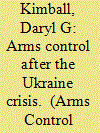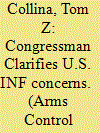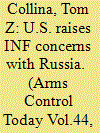|
|
|
Sort Order |
|
|
|
Items / Page
|
|
|
|
|
|
|
| Srl | Item |
| 1 |
ID:
130356


|
|
|
|
|
| Publication |
2014.
|
| Summary/Abstract |
The Global Nuclear Disarmament and risk reduction enterprise is at a crossroads as U.S.-Russian relations have reached perhaps their lowest point in more than a quarter century. Nevertheless, it remains in U.S. and Russian interests to implement existing nuclear risk reduction agreements and pursue practical, low-risk steps to lower tensions. Present circumstances demand new approaches to resolve stubborn challenges to deeper nuclear cuts and the establishment of a new framework to address Euro-Atlantic security issues.
Even before the recent political turmoil in Ukraine and Russian President Vladimir Putin's extralegal occupation and annexation of Crimea, relations between Moscow and Washington were chilly. Despite U.S. adjustments to its missile defense plans in Europe that eliminate any threat to Russian strategic missiles, Putin rebuffed U.S. President Barack Obama's proposal last June to reduce U.S. and Russian strategic stockpiles by one-third below the ceilings set by the New Strategic Arms Reduction Treaty (New START).
Moving forward will be difficult, but doing nothing is not an option. Through earlier crises during and after the Cold War, U.S. and Russian leaders pursued effective arms control and disarmament initiatives that increased mutual security and significantly reduced the nuclear danger. Much has been achieved, albeit too slowly, but there is far more to be done.
As the world's non-nuclear-weapon states persuasively argue, U.S. and Russian stockpiles still far exceed any plausible deterrence requirements, and the use of just a few nuclear weapons by any country would have catastrophic global consequences. As the 2015 Nuclear Nonproliferation Treaty (NPT) Review Conference approaches, pressure to accelerate action on disarmament will only grow.
For now, neither Russia nor the United States wants to scrap the existing arms control regime, including New START and the Intermediate-Range Nuclear Forces (INF) Treaty, which provide greater predictability and stability in an otherwise strained bilateral relationship. A return to a period of unconstrained strategic nuclear competition would not only deepen the distrust and increase dangers for both sides, but also would undermine the NPT. Scrapping the existing nuclear risk reduction measures would do nothing to protect Ukraine from further Russian aggression or reassure nervous NATO allies.
Unfortunately, the profound tensions over Ukraine delay the possibility of any formal, bilateral talks on nuclear arms reductions and missile defense. In light of these realities, Obama and other key leaders must explore alternative options to reduce global nuclear dangers and defuse U.S.-Russian strategic tensions.
|
|
|
|
|
|
|
|
|
|
|
|
|
|
|
|
| 2 |
ID:
131617


|
|
|
|
|
| Publication |
2014.
|
| Summary/Abstract |
A U.S. congressman provided new details in late April about the Obama administration's allegation that Russia may be breaching a key U.S.-Russian arms control treaty, stating that Moscow may have tested a cruise missile from a prohibited launcher. At a joint April 29 hearing of two House Foreign Affairs Committee panels, Rep. Brad Sherman (D-Calif.) said that Russia claims to have tested an intermediate-range missile for use at sea, which is allowed under the 1987 Intermediate-Range Nuclear Forces (INF) Treaty, but that Moscow used "what appears to be an operational, usable ground-based launcher," which is not allowed. Sherman said that "it appears as if [the Russians] were developing a ground-based capacity for this intermediate missile.
|
|
|
|
|
|
|
|
|
|
|
|
|
|
|
|
| 3 |
ID:
129131


|
|
|
|
|
| Publication |
2014.
|
| Summary/Abstract |
The U.S. State Department confirmed in January that Russia may have breached a landmark arms control agreement by testing a new cruise missile, but has not concluded that Russia violated the accord.
Confirming the details of a Jan. 29 report in The New York Times, State Department spokeswoman Jen Psaki said at a Jan. 30 press briefing that the United States has raised the "possibility of…a violation" with Russia and U.S. NATO allies. The specific U.S. allegation is that Moscow flight-tested a new medium-range, land-based cruise missile. Such a test would run afoul of the 1987 Intermediate-Range Nuclear Forces (INF) Treaty, which permanently bans ground-launched ballistic or cruise missiles capable of traveling 500 to 5,500 kilometers. Rose Gottemoeller, acting undersecretary of state for arms control and international security, has discussed the issue with her Russian and NATO counterparts, Psaki said, adding that "there's still an ongoing review, an interagency review, determining if there was a violation." Psaki indicated that the administration does not view the INF Treaty as being in serious jeopardy.
|
|
|
|
|
|
|
|
|
|
|
|
|
|
|
|
|
|
|
|
|